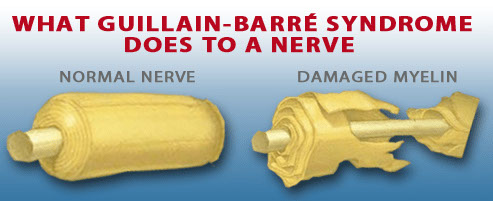
Guillain-Barre (Ghee-yan Bah-ray) Syndrome (GBS) is a rare disorder that causes your immune system to attack your peripheral nervous system (PNS). It preventing the nerves from sending signals to the muscles. It’s also called:
GBS is characterized by the rapid onset of numbness, weakness, and often paralysis of the legs, arms, breathing muscles, and face. Paralysis is ascending, meaning that it travels up the limbs from fingers and toes towards the torso. Loss of reflexes, such as the knee-jerk, are usually found.
Guillain-Barre syndrome is a rare but serious autoimmune disorder in which the immune system attacks healthy nerve cells in your peripheral nervous system. This leads to weakness, numbness, and tingling. It can eventually cause paralysis. This cause of this condition is unknown, but it’s typically triggered by an infectious illness, such as the stomach flu or a lung infection.

The precise cause of Guillain-Barre is unknown. According to the Centers for Disease Control and Prevention (CDC), about two-thirds of people with Guillain-Barre develop it soon after they’ve been sick with diarrhea or a respiratory infection. This suggests that the disorder may be triggered by an improper immune response to the previous illness.
Campylobacter jejuni infection has been associated with Guillain-Barre. Campylobacter is one of the most common bacterial cause of diarrhea in the United States. It’s also the most common risk factor for Guillain-Barre. Campylobacter is often found in undercooked food, especially poultry.
The following infections have also been associated with Guillain-Barre:
Anyone can get Guillain-Barre, but older adults and men are most likely to contract it.
In Guillain-Barre syndrome, your immune system attacks your peripheral nervous system. The nerves in your peripheral nervous system connect your brain to the rest of your body and transmit signals to your muscles. The muscles won’t be able to respond to signals they receive from your brain if these nerves are damaged.
The first symptom is usually a tingling sensation in your toes, feet, and legs. The tingling spreads upward to your arms and fingers. The symptoms can progress very rapidly. In some people, the disease can become serious in just a few hours.
Guillain-Barre is difficult to diagnose at first. This is because the symptoms are very similar to those of other neurological disorders or conditions that affect the nervous system, such as botulism, heavy metal poisoning, or meningitis.
Our doctor will ask questions about specific symptoms and your medical history. Be sure to tell Our doctor about any unusual symptoms you’re experiencing and if you’ve had any recent or past illnesses or infections.
***We Promise, no spam!
Andhra Pradesh Most Advanced Neuro Treatment
Services,At Sri Padmavathi Multi-Specialty Hospital
providing the latestand most advanced treatment
modalities.
© 2021, Sri Padmavathi Hospital. All Rights Reserved.